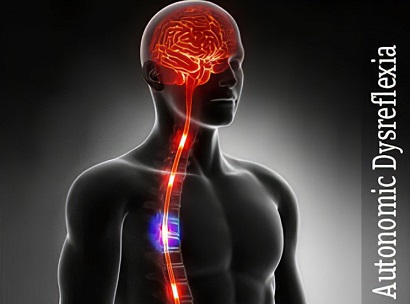COVID-19 News: Study Finds That Most Post-COVID Individuals Who Only Had Mild Infections Suffer From Asymptomatic Autonomic Dysregulation!
Nikhil Prasad Fact checked by:Thailand Medical News Team Dec 28, 2023 2 years, 1 month, 2 weeks, 4 days, 23 hours, 4 minutes ago
COVID-19 News: The aftermath of COVID-19 is proving to be a complex and lingering challenge for many individuals, extending well beyond the acute phase of infection. As researchers delve into the intricacies of post-COVID complications, autonomic dysregulation has emerged as a focal point of interest. This study covered in this
COVID-19 News report, seeks to illuminate the presence of autonomic dysregulation in individuals who experienced only mild COVID-19 infections, focusing on asymptomatic cases. The investigation not only aims to contribute to the understanding of post-COVID complications but also holds potential significance for early detection and intervention strategies.
 Autonomic Dysregulation in the Context of COVID-19
Autonomic Dysregulation in the Context of COVID-19
COVID-19 is a systemic disorder that transcends the respiratory system, affecting various organs and functions. Its diverse symptomatology includes respiratory issues, cognitive impairments, anosmia, dysgeusia, sleep disturbances, anxiety, depression, palpitations, and arrhythmias. Importantly, these symptoms persist into the post-infectious period, afflicting 20 to 40% of individuals, posing a substantial challenge to post-recovery life.
Understanding the mechanisms behind these post-COVID complications is imperative for evidence-based clinical communication and effective management. Previous studies have implicated autonomic dysregulation as a contributing factor. Heart rate variability (HRV) analysis has proven to be a valuable tool in this context. Research has shown associations between HRV indices and immune function, D-dimer, and NT-proBNP in severe COVID-19 cases, suggesting a link to poor prognosis.
Moreover, autonomic dysfunction has been correlated with various cardiovascular complications, such as postural orthostatic tachycardia syndrome, orthostatic hypotension, and inappropriate sinus tachycardia in post-COVID patients. Recognizing the importance of early detection, several studies have explored autonomic conditions in asymptomatic post-COVID individuals. However, findings have varied, highlighting the need for more specific investigations.
The Three-Behavioral-State Paradigm
This study adopts a comprehensive approach by utilizing a three-behavioral-state paradigm to assess autonomic activity. The paradigm includes an initial rest state, a task performance state, and a post-task rest state. This structured approach allows for a nuanced analysis of autonomic responses in different behavioral contexts. Notably, this methodology has been successful in previous studies examining depression, anxiety, and fatigue.
Participants in this study, who had recovered from mild COVID-19 infections, were evaluated using HRV analysis during each behavioral state. The comparison was made with a control group comprising individuals without a history of COVID-19 infection. The objective was to discern any subtle autonomic dysregulation in asymptomatic post-COVID individuals, particularly in response to stressors presented during the task performance.
Results and Findings
The study revealed intriguing findings regarding the autonomic r
esponses of asymptomatic post-COVID individuals during the three behavioral states. At the initial rest state, HRV indices-including low-frequency (LF), high-frequency (HF), LF/HF ratio, and heart rate (HR)—showed no significant differences compared to the control group. This implies that autonomic activity at rest was seemingly well-regulated in the asymptomatic post-COVID state.
During the task performance state, however, a distinct pattern emerged. The post-COVID individuals exhibited an attenuation of LF/HF increment, indicating a potential autonomic dysregulation in response to the applied stressor. Interestingly, other HRV and HR indices during the task state showed no abnormalities, suggesting a specific response to stressors rather than a global autonomic dysfunction.
The most noteworthy findings occurred during the post-task rest state.
Asymptomatic post-COVID individuals displayed an excessive increase in HF, coupled with a decrease in LF, LF/HF, and HR, in comparison with the initial rest scores. These abnormalities were consistent with asymptomatic autonomic dysregulation, suggesting a pronounced shift in autonomic balance towards parasympathetic dominance after the task load was removed.
Discussion and Implications
The study's findings underscore the nuanced nature of autonomic dysregulation in asymptomatic post-COVID individuals. Unlike some similarities observed with depression and chronic fatigue syndrome, the autonomic responses to the task load were notably intact in post-COVID subjects. This suggests a distinctive pathophysiological condition in asymptomatic post-COVID autonomic dysregulation.
Of particular interest is the observed autonomic dysregulation after the task load, indicating a concomitant parasympathetic hyperactivation and sympathetic deactivation. This unique autonomic profile may serve as a potential warning sign for the occurrence of post-COVID complications. The study prompts further exploration into the relationship between this autonomic dysregulation and various post-COVID effects, including depression and fatigue.
Limitations and Future Directions
While shedding light on autonomic dysregulation, the study acknowledges certain limitations. The control group comprised individuals without a history of COVID-19, and future research should consider using subjects with similar working environments for a more accurate comparison. Additionally, factors such as menstrual phase, circadian changes, and meal content were not analyzed, warranting exploration in future investigations.
Further research should focus on subjects with the same working environment, providing a more nuanced understanding of autonomic responses in specific contexts. Utilizing a higher sampling frequency and extending the duration of each behavioral state could strengthen the study's findings and enhance their clinical relevance.
Conclusion
In conclusion, this study illuminates the presence of autonomic dysregulation in asymptomatic individuals who have experienced mild COVID-19 infections. The three-behavioral-state paradigm proved effective in revealing distinct patterns of HRV abnormalities, particularly after the task load, suggesting a potential link to post-COVID complications. Monitoring autonomic activity in asymptomatic individuals could serve as an invaluable early detection method for silent autonomic alterations, offering a window for timely intervention and comprehensive post-COVID management. As the world continues to grapple with the long-term repercussions of the pandemic, understanding the subtle yet significant autonomic changes in post-COVID individuals becomes indispensable for holistic healthcare practices.
The study findings were published in the peer reviewed journal: Healthcare.
https://www.mdpi.com/2227-9032/12/1/43
For the latest
COVID-19 News, keep on logging to Thailand Medical News.
